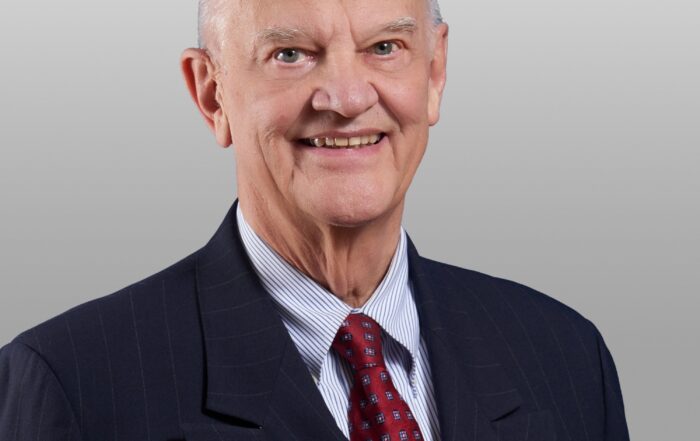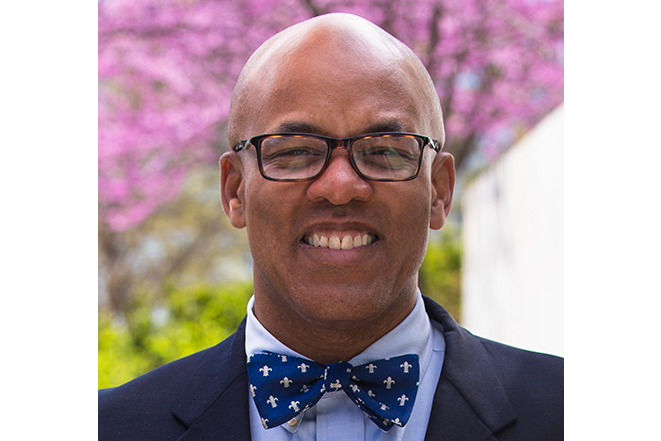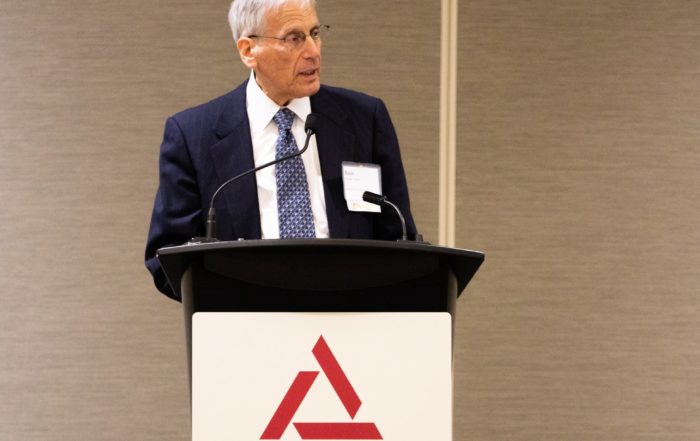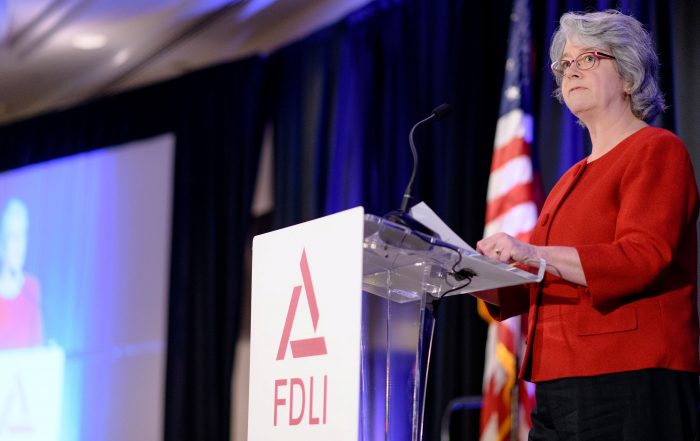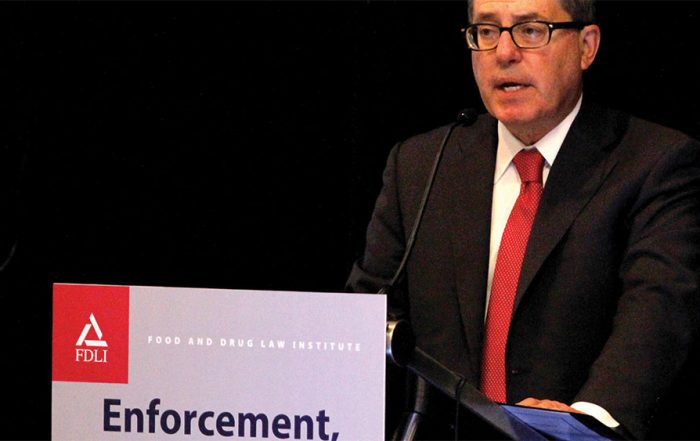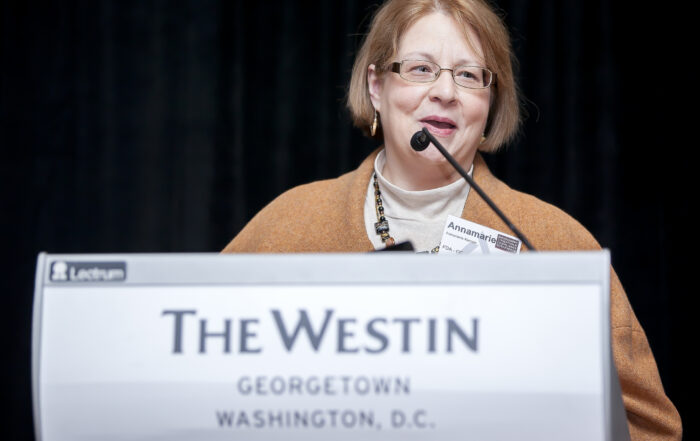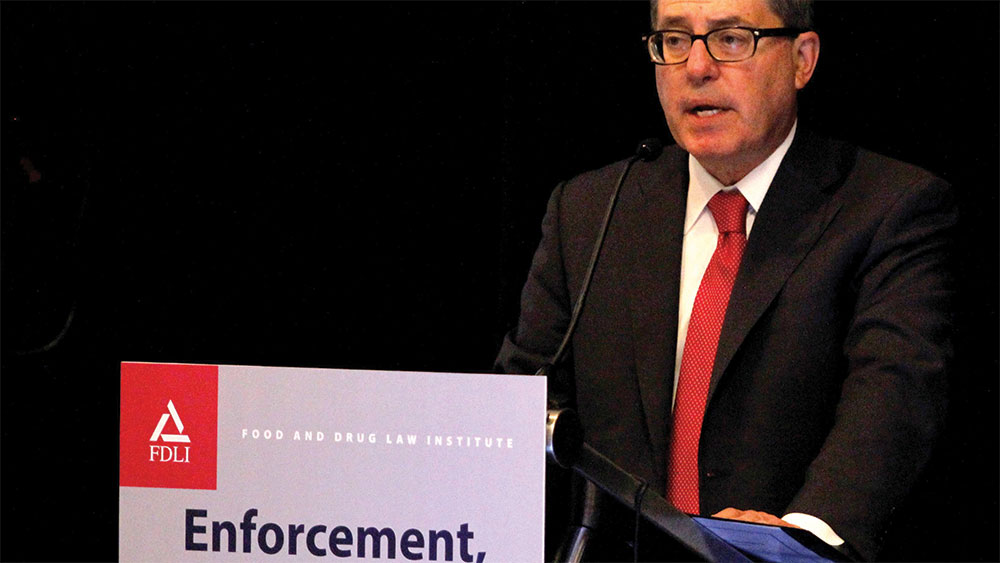
4th Annual Eric M. Blumberg Memorial Lecture
John R. Fleder Reflects on His Career in FDA Law at FDLI’s Enforcement, Litigation, and Compliance Conference
By John R. Fleder
Good afternoon. Thank you Jennifer [Bragg] for such a warm and personal introduction. It is a privilege to present this FDLI lecture which honors the memory of a giant in the food and drug bar, Rick Blumberg.
I met Rick when he was a young lawyer at FDA. I was at the Department of Justice (DOJ). We worked on cases together. Sometimes it did not seem as if we were on the same side, even though we both represented the government. Rick was smart and tough. He was usually doctrinaire. But above all, he was loyal, but not to himself. His defining quality was that everything he did was what he thought was best for FDA.
In 1990, Rick was an FDA staff attorney. I had become head of the office at DOJ that handles FDA cases. Then-FDA Chief Counsel Margaret Porter called to discuss the opening in the office as the agency’s top litigator. Margaret asked if DOJ could work well with Rick. I responded yes. I always wondered what Margaret would have done if I had said no. Perhaps all those lawyers he supervised would never have had to deal with his demands to do things his way based on his vast knowledge of food and drug law. Perhaps companies facing enforcement actions would never have dealt with the sometimes controversial litigation policies that Rick successfully established for FDA. Perhaps the many FDA employees in the Centers and the Districts would have had to deal with someone else in Rick’s position who might have been more likely to utter the word “yes.” What I do know is that Margaret selected someone who was highly competent, creative, effective, and loyal.
I started my career at DOJ in 1973 in the then-named Consumer Affairs Section in the Antitrust Division. It was a newly created unit of seven attorneys. That Section was created because of the rise of the consumer protection movement, which was called Naderism for consumer rights crusader Ralph Nader. Before then, FDA cases were handled by DOJ’s Criminal Division. Criminal Division attorneys almost never got involved in those cases. FDA attorneys usually handled their own cases, with little input from DOJ lawyers in Washington but assistance in some cases from local United States Attorneys. With this background, you can imagine how happy FDA was when DOJ created the Consumer Affairs Section.
The battles between the DOJ and FDA lawyers were intense and unproductive for both offices. They battled over who would write a brief, what arguments would be made, and who would present the argument to the court. Often, it appeared that “turf protection” was the most important concept in my job
description.
In 1980, FDA and DOJ began to realize that these battles needed to stop. As a result, a number of us worked hard to change the culture that had caused so much friction between the offices. This cooperative effort continued at least through my departure from the office in 1992.
There were many civil seizure actions, usually against food and drug products. I actually felt sorry for the defendants. In a case styled United States of America v. 100 Jars of Peanut Butter, how could one not root for the poor peanut butter? After all, it was facing the entire country as the opponent.
FDA also routinely asked DOJ to file many of what we now call “real” Park cases, where the individuals being prosecuted often had no direct involvement in the conduct at issue and no knowledge of the violations that got them criminally prosecuted. Much of my work involved analyzing these cases in terms of prosecutorial merit. Fortunately, every case had been thoroughly analyzed by FDA. Most of the cases pleaded out with fines of less than what we would today consider the cost of a good meal for four people.
When I went into private practice years later, I decided to write an article on the Park Doctrine. I called Rick Blumberg to discuss whether FDA was still doing those cases. After I listened to complaints about prosecutors not doing their jobs correctly, Rick suggested that I make the theme of the article that FDA and DOJ should bring more of those cases. I told Rick that making that suggestion would not be a wise career move for me in terms of having clients.
My early career at DOJ certainly started slowly. My first boss told me that if my performance did not improve, I would need to get a new job. I decided that my best path to success was to learn as much as possible about the relevant laws and court rulings. I needed that edge to compensate for my total ignorance of science. Somehow, I have bluffed my way for almost 44 years about science. One FDA employee who saw my science ignorance asked me how the agency got stuck with me as its counsel. I learned quickly that I had to take advantage of my strengths, and rely on others for help on the science.
My first appellate argument was in the Seventh Circuit. I inherited the case from another attorney who had written the brief. My boss gave me the argument because he told me I could not possibly lose the case. My opponent argued first and was terrible, giving me much needed confidence. However, it quickly became clear that despite my best efforts, the court, which included then-Circuit Judge John Paul Stevens, was not buying my presentation: “Counsel: You represent the United States. Whatever we expect from other litigants with regard to these legal issues, the government did not follow the standards we expect the government to follow when this case was in the district court.” At the end of my argument, the three judges announced that they were summarily reversing the lower court ruling that I was defending. That is the first and only time I have ever heard of an appellate court reversing a lower court decision at the oral argument itself.
My second oral argument did not go too well either. Now Justice Anthony Kennedy was on that panel. I was representing the Consumer Product Safety Commission. The Commission had written a decision that we could not defend. Instead, the CPSC lawyer and I, in effect, rewrote the CPSC’s decision in our brief to try to save the decision. Regrettably and not unexpectedly, we were called on that strategy by the esteemed FDA practitioner Joel Hoffman. At the oral argument, Joel argued first. The presiding judge gave Joel a hard time until Joel asked if he thought that Joel represented the CPSC. When the Judge said yes, Joel pointed at me and said, “No—he represents the CPSC.” The Judge told Joel to sit down because he wanted to question me. It will not surprise you to hear that I lost that case also.
As the years went by, my success rate did improve. Perhaps I got luckier with the cases I was assigned. I had one case involving criminal contempt of a Fourth Circuit order. The matter included a rare trial in the Fourth Circuit itself before an appellate judge. My opposing counsel, who later became Chairman of the House Judiciary Committee, unsuccessfully tried to kill the case by appealing to the higher-ups in the Justice Department. The constitutional issues regarding where a contempt action could be brought, whether the defendant was entitled to a jury trial, and, eventually, whether the government could collect a judgment from a bankrupt company, produced the most intellectually challenging case of my career.
I worked on another FDA criminal case that brought much amusement and joy. FDA investigators came to my office to discuss how we were going to prosecute a proposed criminal case in Mississippi against individuals who were allegedly selling bogus maple syrup and honey. We understood that these individuals were supposedly former moonshiners who had tired of being busted by ATF. The FDA agents were both shocked and pleased that I had spent so much time analyzing the evidence. To young attorneys, this is something you all should do if you do litigation. Mastery of the facts is usually the key to success. The best trial lawyers do not delegate knowledge of the facts to underlings. Instead, they do the fact gathering and analyzing work themselves.
Eventually, in that case, FDA attorney Catherine Copp and I convinced a federal judge in Mississippi to sentence one of the defendants to jail. We considered this a great victory because the individual had been thumbing his nose at federal and state officials for years. After being sentenced to jail, the defendant hired a new lawyer, James P. Coleman, a retired Judge of the Fifth Circuit, who had earlier been on the Mississippi Supreme Court and earlier had been the Mississippi Attorney General. We also understood that he had been the roommate of the judge hearing our case. Judge Coleman filed a motion to get a three-year jail sentence for his client reduced. We, of course, opposed the motion and we went to Jackson, Mississippi for a hearing. Judge Coleman introduced himself to Catherine and me. He asked if we objected to him going into the judge’s chambers, promising that he and the judge would not discuss the case. I quickly replied that we had no objection. After Judge Coleman went into the judge’s chambers, Catherine looked at me and said, “How could you do that-they are going to discuss the case.” I replied that of course they were going to discuss the case and they would undoubtedly privately work out resolution of the motion. If we had objected, the judge hearing the case would have been insulted and he would have punished the government for not trusting him. Later that day, we had the hearing in chambers and sure enough the judge reduced the sentence from three years to one year in jail. Sounds awful doesn’t it? Not really! In those days, people sentenced to three years in jail actually served one year in jail. People sentenced to one year in jail actually served—you guessed it—one year in jail. Judge Coleman’s client was happy to get his sentence “reduced,” I am sure Judge Coleman had his fee paid, and justice was served because the defendant did the time in jail that he deserved.
I got my career trial when we prosecuted the Beech-Nut apple juice company and two of its executives for selling baby apple juice that was not apple juice at all. I worked with two exceptional attorneys, Assistant United States Attorney Tom Roche and a fellow DOJ attorney Ken Jost. Before bringing the case, we heard a presentation from lawyers from Williams & Connolly, who had recently gained fame as counsel for Oliver North in the Iran-Contra matter. They promised a nuclear war if we indicted their client. They were right. As hard as we worked (I had one day off in four months), the Williams & Connolly lawyers worked just as hard. Our opponents even served a trial subpoena on me. My co-counsel Tom Roche successfully convinced the judge to quash the subpoena. On days before trial, our opponents and the government counsel commonly spoke at 11:00 at night, not fearing that the other side would be sleeping. What a life! The prosecutors received magnificent support from numerous FDA personnel who worked just as hard as the prosecutors. It was the type of collaborative DOJ/FDA effort that almost made me forget the constant turf battles that had existed earlier in my career.
At one point in that case, I had the opportunity to speak with then-FDA Commissioner Frank Young. He thanked us for our efforts but added that he had no disagreement with the enforcement philosophical views of Congressman John Dingell and a person he named who, I later learned, then worked for Congressman Dingell. I got off the phone and asked the FDA personnel if they knew who that staff person was. They also did not know that person or why Commissioner Young would have even mentioned the person’s name. Little did I know that this was my first exposure to what was certainly the darkest days for FDA in my career and perhaps in the agency’s history.
Congressman Dingell and his staff were investigating FDA regarding the so-called generic drug scandal. Generic drug companies were bribing FDA officials and creating bogus test results to get their products approved. Companies demonstrated to FDA that generic products were bioequivalent to the brand product by, believe it or not, testing the brand product against itself. By some miracle the products turned out to be bioequivalent! Congressman Dingell decided that FDA was incapable of enforcing the criminal provisions of the FDC Act. As a result, he pressured the then-HHS Secretary to pull all FDA criminal prosecutions out of FDA and delegate the cases to the HHS OIG. Facing this overwhelming congressional pressure, FDA was powerless to prevent the elimination of its historic power to enforce the criminal provisions of the FDC Act.
However, there was a clear legal obstacle to that delegation that also threatened the legal viability of FDA criminal prosecutions if the HHS OIG took them over. Tom Scarlett, then-FDA’s Chief Counsel, and I worked to try to get the delegation decision reversed on that legal ground. Eventually, DOJ, at the highest levels, forced HHS to return these criminal cases to FDA to avoid this legal quagmire. However, many on the government side who were involved in that effort later paid a heavy price in terms of the backlash from Congress when it learned that DOJ had reversed a decision that Congress had strong-armed. It even got me a personal letter from Congressman Dingell. As you can imagine, that letter was not a birthday greeting.
This series of events was, however, one of my happiest moments in terms of my relationship with FDA. We were at war together, fighting against a Congress that claimed to share the same prosecutorial goals that FDA and DOJ had advocated for many years. I saw the darkest side of Washington politics and the painful damage done to many hard working honest FDA and DOJ officials.
I saw numerous other examples of congressional “oversight” that demonstrated a hidden dark secret of Washington, namely that congressional staffers and their bosses, regardless of party affiliation, have the ability to make life miserable for both government agencies and regulated industry without any real check and balance. For example, in that same generic drug scandal, a highly esteemed practitioner in DC was representing a corporate witness during an interview conducted by a Committee staffer. When the lawyer objected to a question because an answer would violate the company’s attorney-client privilege, the staffer picked up his papers and before leaving the room stated, “Our Committee does not recognize the attorney-client privilege. If this witness will not answer that question, we will issue subpoenas to every company employee until we find someone to answer that question.” The lawyer’s client privately told the lawyer: “We do not need that kind of harassment. I will answer the question.”
My DOJ career ended in 1993. I felt lucky that I had gotten tremendous experience. However, my time had come to leave and I entered private practice. I felt quite liberated there, as I was now free of a bureaucracy that, at times. was totally consuming. Most of my clients did not have in-house counsel. As a result, they just wanted me to tell them what they should do. As you can imagine, this presented a different kind of pressure-the need to be right without having the benefit of agency counsel and others at FDA.
In 2000, I moved to my current home, Hyman, Phelps & McNamara. My new firm had a number of really talented litigators including Jim Phelps, Bob Dormer, Jeff Gibbs, and Doug Farquhar. Because I had just had health issues, I knew that if my health deteriorated, I had fabulous backup support from these litigators and many others.
Let me use the rest of my time to pass on some lessons I have learned. First, food and drug law is unbelievably satisfying. I am amazed that more top notch lawyers do not seek to enter our field. The opportunities are endless and our practice will never go away or diminish no matter whom is in power in Washington.
Any success I have had with FDA is probably based on a few key points. I was never afraid to acknowledge my own deficiencies in this area so that my clients would not suffer.
To be successful in terms of dealing with FDA, one must first and foremost have credibility with the agency. That does not mean rolling over to please FDA. Nor does it mean fighting them all the time.
It means making sure that FDA trusts both you and what you tell them. It also means focusing on what is important to FDA. My partner, Bob Dormer, and I were hired for what we called at the time, “Mission Impossible”—to convince FDA to allow testimony of one of its employees in a private suit. Bob and I realized that the previous attorney had made brilliant legal and factual arguments, but had nonetheless missed the boat. He forgot my first rule of communication with FDA: “Focus on your audience and their needs.” We needed to convince FDA that it was in FDA’s interest to allow the testimony. Initially, the FDA attorneys, including Rick Blumberg, were skeptical. Rick kept saying “why should we allow the testimony.” We eventually convinced FDA to allow one of its employees to testify, but not by arguing the law or the equites. Rather, we demonstrated how the testimony would be in FDA’s best interests. Once FDA announced that the testimony would occur, the other side quickly settled the case, to avoid that testimony.
My second rule is that we must pay attention to the little things, because often they are what kills us. If you write a letter to FDA and misspell a name or get a title wrong, you may have lost your audience. Also, remember who your audience is. It may not be the person you are writing the letter to. Instead, the letter may be addressed to one person when you know that your real audience is that person’s supervisor. If you write a letter to FDA, read it first by putting on your “FDA hat.” Consider how FDA people will react to the letter. Are you insulting their intelligence by explaining things that you know they well understand? In contrast, make sure that you fully advocate your position even if the person receiving the communication knows much of what you are writing. After all, we frequently need to make a record and explain things in the communication so that everyone understands the complete background, particularly FDA supervisors who may not otherwise have that background.
My next lesson is trust, but verify. A client and its counsel’s reputations at FDA are what give arguments credibility. I often find myself questioning what clients tell me. The reason is not because I think they are lying (that has rarely occurred). Rather, clients do make factual assertions that turn out to be false because the client did not adequately determine the truth of the statements. One can save mountains of difficulties with FDA by independently reviewing the facts and/or asking the clients to make certain they verify those facts.
FDA does not need to be your enemy. All too often companies do one of two things—either they automatically agree to do whatever FDA demands without thinking of the consequences of doing what they agreed to do, or they fight with FDA because they think that FDA is stupid or being meddlesome in their business. If what FDA asks for does not make sense, explain that to FDA. If FDA wants something by a certain date, do not promise to meet that deadline unless you are sure the deadline can be met. If you disagree with FDA, do it respectfully. Often that disagreement best comes from outside counsel. I usually tell clients that they should be the one to say yes to FDA and I should be the one to say no, whenever a no answer is necessary. Most FDA personnel will generally listen to reason if expressed properly and respectfully.
Putting aside the Hatch-Waxman cases, where companies are really fighting each other for the right to market products, wars against FDA are rarely won. Just ask the companies who beat FDA in court and find that the war with FDA has just begun. I often say that litigation involving FDA involves three parties—FDA, the client, and its outside counsel. Litigation often results in only one of the three winning—the outside counsel, which gets paid for the war. Of course, I note with sadness how little outside counsel gets compensated in comparison to the FDA consultants, who we frequently retain for our clients!
With that said, litigation with FDA in the right circumstances is a valid and proper exercise. Applicable legal requirements are often established in litigation, allowing both industry and FDA to understand the rules of the road. Litigation may also be the only way for a company to get the result it believes is necessary.
Companies often get frustrated by their inability to effectively communicate with FDA. Meetings with FDA are sought and refused all too often. I call on FDA as an institution to revisit its meeting policies. Look to the FTC as a model. Most lawyers in private practice can get a meeting with FTC Staff merely by requesting one. I cannot understate the value to clients that these meetings bring. Whether or not they convince the government, at least companies get the satisfaction of knowing that their views have been considered and heard. In contrast, imagine the reaction when companies cannot get a meeting they desperately want and need, or actually seek and get an FDA meeting but find themselves severely outnumbered at the meeting. FDA would be better served increasing its willingness to meet with regulated industry and limiting the number of FDA attendees at those meetings in order to increase their availability to attend as many meetings as possible.
Rick Blumberg understood the importance of FDA meetings with industry. He was one of the first persons at FDA who encouraged companies to seek meetings with FDA before suing the agency. Those meetings have ended up avoiding unnecessary lawsuits. I am so pleased that Annamarie Kempic has continued that tradition.
The best meetings are ones where Company representatives do not talk down to FDA or treat FDA personnel as if they are stupid. FDA personnel do care about the jobs they do. It is the Company’s job to respectfully convince FDA that the Company’s position is correct and that the Company can be trusted to do the “right thing.”
Conversely, my experience with industry is that most companies and their representatives are as honest as the FDA regulators. One expression I see all too often coming out of the government are the words “bad actor” to describe a company or individual. I suggest that this phrase be discarded by the government. It is a short hand way of saying that the government will do whatever is necessary to punish the “bad actor” because the ends justify the means.
Do companies act as quickly as FDA expects? All too often the answer is no. But the government should not assume that the malefactor is doing so intentionally. FDA must not assume the worst about the companies’ intentions until shown otherwise.
We hear quite a bit these days regarding the government’s expectation that companies will fully cooperate in government investigations. However, I have learned in private practice that the hard calls for me are not what my clients should do when a government investigation begins. The really difficult recommendations come when a client learns that its employees may have engaged in illegal and perhaps fraudulent activity. In these situations, clients often want outside counsel to do an independent investigation to determine the facts. Once the investigation is completed, should the company make a voluntary disclosure of the facts to the government, which may otherwise never hear about those facts? For years I have publicly called on FDA to announce what it will do if a company makes a voluntary disclosure when there is no government investigation. Until the government provides concrete incentives regarding both the company and the individuals involved in the conduct, rather than vague and unspecific “assurances,” the government is missing out on the opportunity to learn of many violations of law.
My last message is to FDA. Treasure the important mission that you have to protect us all from dangerous products. You do a remarkable job. But you need to listen to your constituents and the courts. The First Amendment is not contained in the FDC Act, an absence that has been claimed by a number of FDAers as being important to their mission. But the First Amendment supersedes any conflicting FDA law, regulation, or policy. Whether you like it or not, your regulation of industry is governed by the U.S. Constitution. Similarly, when you have policies that please no one, it is time to reexamine those policies. A recent blog posting we did on the drug approval process proves that point.
As I retire from FDA practice at the end of this year, I readily acknowledge how lucky I have been in my professional career. I have faced many challenges and few boring moments. I have met and worked with many wonderful people and very few who I disliked. Being a food and drug lawyer has brought me so much happiness and satisfaction. I see many faces in this room who helped make that possible.
I have enjoyed working with many FDA Chief Counsels who provided expertise and competence that were beneficial to both FDA and the public good. I was lucky that one such Chief Counsel, Tom Scarlett, later became my law partner. Also, I was lucky to work with so many really talented other lawyers at FDA, both while I worked at DOJ, and later when I have been in private practice.
Similarly, I was fortunate to be surrounded by many amazing attorneys in my years at DOJ. They brought expertise and hard work to a job that offered in return little pay but what one lawyer in private practice once referred to as “psychic income (a substitute, but perhaps not a real substitute, for cash income).”
I learned one thing over the years that surprised me with regard to political appointees whom I worked for. The good ones were smart, cared about the people they supervised, and did not treat the career employees as the enemy. That was not surprising. What was surprising is that political and ideological affiliation made little difference in terms of the quality of the political appointee, or in terms of influencing my job.
Similarly, the career people I worked with in the government were almost without exception dedicated to the mission of the agency they worked for. If the goals of that agency changed through an administration change, the career staff understood and went along with the altered mission without trying to sabotage the new political employees. That is of course the way it should be!
Thank you, FDLI, so much for giving me this opportunity to speak to you today.
Blumberg Lectures

